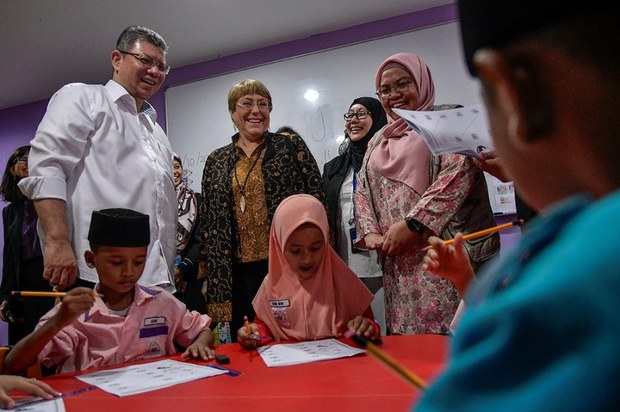Malaysian Leaders Discuss Human Rights Issues with UN High Commissioner
2019.10.04
Kuala Lumpur
 Foreign Minister Saifuddin Abdullah (left) and U.N. High Commissioner for Human Rights Michelle Bachelet visit the Rohingya Integrated School of Excellence in Selangor, Malaysia, Oct. 4, 2019.
Foreign Minister Saifuddin Abdullah (left) and U.N. High Commissioner for Human Rights Michelle Bachelet visit the Rohingya Integrated School of Excellence in Selangor, Malaysia, Oct. 4, 2019.
Prime Minister Mahathir Mohamad said he discussed concerns about the Rohingya Muslim minority and the impact of climate change with U.N. High Commissioner for Human Rights Michelle Bachelet on Friday during the first-ever visit to Malaysia by a top rights official in the world body.
Their 90-minute meeting was closed to the media and neither spoke afterward. Bachelet made Malaysia her first visit to Southeast Asia since her appointment in September 2018 as the U.N.’s human rights chief.
Mahathir, who raised similar concerns when speaking at the United Nations General Assembly in New York last week, posted a tweet to his official account after Friday’s meeting.
“Had the pleasure of receiving U.N. High Commissioner for Human Rights Michelle Bachelet today. We discussed Malaysia’s effort during UNGA last week in highlighting human rights issues such as the plight of the Rohingya and how climate change will affect human rights,” he tweeted.
Earlier Friday, Bachelet, who was on a four-day visit to Malaysia, met with Foreign Minister Saifuddin Abdullah, who had extended an invitation to her to visit Malaysia on the sidelines of a human rights event in Geneva in February.
In addition to their meeting, Bachelet and Saifuddin visited a school for 41 Rohingya children founded by a Muslim NGO outside Kuala Lumpur. The Muslim-majority country is a top destination in Southeast Asia for Rohingya, whose persecution in Myanmar had forced them to flee overseas, mainly to Bangladesh.
About one million Rohingya refugees are sheltering in Bangladesh. Most of them fled after Myanmar government security forces launched a brutal crackdown in August 2017 in the wake of deadly attacks by Rohingya insurgents on police and army posts in Rakhine state. Various U.N. and international agencies and NGOs described the campaign as ethnic cleaning, if not genocidal.
Efforts to repatriate them back to Myanmar had failed because the Rohingya were worried about their security.
![191004-MY-UN-inside.jpg Malaysian Prime Minister Mahathir Mohamad (left) greets U.N. High Commissioner for Human Rights in Kuala Lumpur, Oct. 4, 2019. [Courtesy Prime Minister’s Office]](/english/news/malaysian/UN-rights-chief-10042019170428.html/191004-MY-UN-inside.jpg/@@images/5c0904ae-01d8-42ec-8b42-966f0584badf.jpeg)
At the U.N. General Assembly in New York last month, Mahathir criticized the Myanmar government, led by Nobel Peace Prize laureate Aung San Suu Kyi, for dragging its feet to resolve the Rohingya crisis and U.N. for its “deafening” silence.
Bachelet posted a tweet on her account following the visit: “Everyone has a right to #education. Everyone deserves the chance to learn skills to build a better future. It was a pleasure to visit the #Rohingya Integrated School of Excellence, an alternative learning center in #Malaysia for #refugees from #Myanmar.”
Saifuddin said that Mahathir’s government welcomed visits by U.N. officials to the country.
“Prior to this, the government did not have an open invitation. There were also times when U.N. high commissioners’ or rapporteurs’ requests to visit in Malaysia were even turned down,” he told reporters.
Malaysia is transparent and the high commissioners and U.N. rapporteurs who come to the country are free to write reports and make suggestions, Saifuddin added.
“The present government has nothing to hide and if there are weaknesses in the administration, we are prepared to improve as we are really open.” he said.
The foreign affairs ministry issued a statement on Thursday calling Bachelet’s visit an acknowledgement of Malaysia’s effort to improve human rights since Mahathir’s government took power in May 2018. She is expected to meet with members of the Human Rights Commission (Suhakam) on Saturday.








